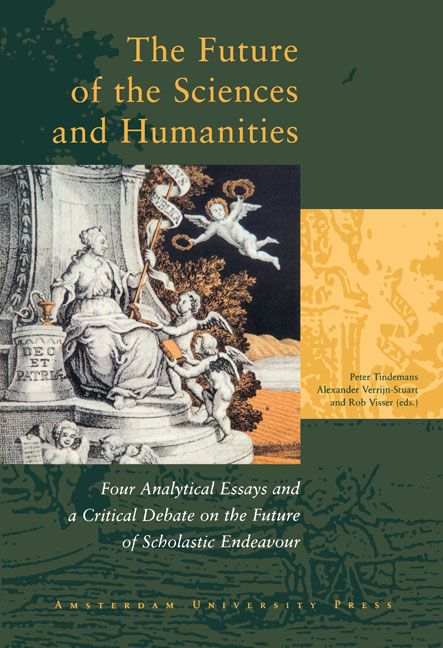 The Future of the Sciences and Humanities
The Future of the Sciences and Humanities Book contents
- Frontmatter
- Preface
- Contents
- 1 The Sciences and Arts Debate A review and some conclusions
- 2 Historical and Structural Approaches in the Natural and Human Sciences .
- The Role of Laws and Contingency in History
- 3 Science and Society in Flux
- Does A New Kind of Science Require a New Kind of Scholar or a New Kind of University?
- 4 Science for the 21st Century
- Redrawing Disciplinar Boundaries – but to What Degree?
- 5 Science and Democracy
- Science and Democracy: a Difficult Relationship: ‘An enlightened and elitist essay on an unresolvable problem’
- 6 Epilogue
- 7 Appendix
6 - Epilogue
Published online by Cambridge University Press: 03 February 2021
- Frontmatter
- Preface
- Contents
- 1 The Sciences and Arts Debate A review and some conclusions
- 2 Historical and Structural Approaches in the Natural and Human Sciences .
- The Role of Laws and Contingency in History
- 3 Science and Society in Flux
- Does A New Kind of Science Require a New Kind of Scholar or a New Kind of University?
- 4 Science for the 21st Century
- Redrawing Disciplinar Boundaries – but to What Degree?
- 5 Science and Democracy
- Science and Democracy: a Difficult Relationship: ‘An enlightened and elitist essay on an unresolvable problem’
- 6 Epilogue
- 7 Appendix
Summary
When attempting to sum up the essays, the comments of the discussants and the exchanges in the Debate itself, two major themes would seem to dominate today's thinking and concerns:
– the blurring of disciplinary boundaries
– the need for social embedding of ‘science’
They become manifest in different disguises, such as:
– the need to rethink the organization of our universities and other scientific research institutions;
– the evolution of and the increasing connection between the approaches to investigation in the sciences and humanities;
– the financial needs of science on the one hand, and the business opportunities created by science, on the other;
– the many areas and activities in our societies in which education and understanding of the sciences are crucial, including the limitations of their claims to socially useful and relevant knowledge.
If we should like to draw some conclusions at this stage, it may be done by fleshing out these last four points into broader statements:
– After two centuries of largely university-centred, monodisciplinary institutions, the future ‘scientific enterprise’ will comprise a fluid mix of scholars with varying backgrounds. Compared to the past it will be conducted much more outside, although often in close cooperation with, academic and the other traditional centres of education, research and development. Engineering and design activities may well constitute the primary tasks of new entities concerned with both physical production and non-physical services, but these will be intertwined inextricably with fundamental research.
– The area of information and cognition beautifully illustrates that to arrive at ‘relevant’ knowledge – not just aiming at short-term economic or political gains, but appropriate to this uniquely human endeavour – one cannot stick to separate disciplinary approaches or narrow research traditions. This is not saying that anything goes, to paraphrase Paul Feyerabend, but just continuing our ways from the past and in isolation certainly will not do.
– Funding of ‘scientific’ activity will become ever more complex as innovation and knowledge become broader and more widespread phenomena. The traditional national GDP-related indicator for public and traditional enterprise financing of R&D will come to hide a much more varied reality. There is the entrepreneurial nature of research in the context of innovative organizations that will generate its own remuneration. There is the increasing difficulty of defining and measuring innovative activities.
- Type
- Chapter
- Information
- The Future of the Sciences and HumanitiesFour Analytical Essays and a Critical Debate on the Future of Scholastic Endeavor, pp. 227 - 230Publisher: Amsterdam University PressPrint publication year: 2002


